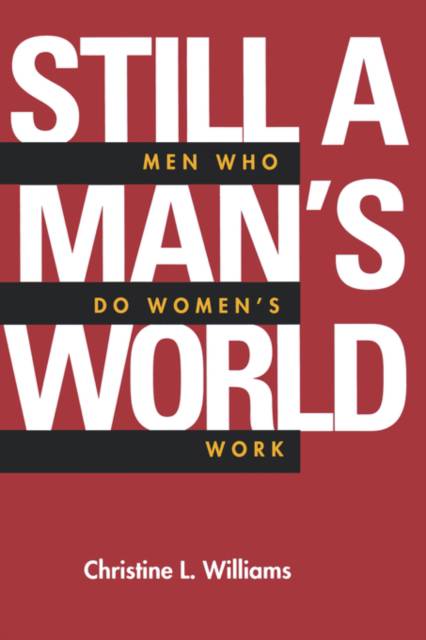
- Afhalen na 1 uur in een winkel met voorraad
- Gratis thuislevering in België vanaf € 30
- Ruim aanbod met 7 miljoen producten
- Afhalen na 1 uur in een winkel met voorraad
- Gratis thuislevering in België vanaf € 30
- Ruim aanbod met 7 miljoen producten
Zoeken
€ 54,45
+ 108 punten
Omschrijving
Men who do "women's work" have consistently been the butt of jokes, derided for their lack of drive and masculinity. In this eye-opening study, Christine Williams provides a wholly new look at men who work in predominantly female jobs. Having conducted extensive interviews in four cities, Williams uncovers how men in four occupations-nursing, elementary school teaching, librarianship, and social work-think about themselves and experience their work.
Contrary to popular imagery, men in traditionally female occupations do not define themselves differently from men in more traditional occupations. Williams finds that most embrace conventional, masculine values. Her findings about how these men fare in their jobs are also counterintuitive. Rather than being surpassed by the larger number of women around them, these men experience the "glass escalator effect," rising in disproportionate numbers to administrative jobs at the top of their professions. Williams finds that a complex interplay between gendered expectations embedded in organizations, and the socially determined ideas workers bring to their jobs, contribute to mens' advantages in these occupations.
Using a feminist psychoanalytic perspective, Williams calls for more men not only to cross over to women's occupations, but also to develop alternative masculinities that find common ground with traditionally female norms of cooperation and caring. Until the workplace is sexually integrated and masculine and feminine norms equally valued, it will unfortunately remain "still a man's world."
Contrary to popular imagery, men in traditionally female occupations do not define themselves differently from men in more traditional occupations. Williams finds that most embrace conventional, masculine values. Her findings about how these men fare in their jobs are also counterintuitive. Rather than being surpassed by the larger number of women around them, these men experience the "glass escalator effect," rising in disproportionate numbers to administrative jobs at the top of their professions. Williams finds that a complex interplay between gendered expectations embedded in organizations, and the socially determined ideas workers bring to their jobs, contribute to mens' advantages in these occupations.
Using a feminist psychoanalytic perspective, Williams calls for more men not only to cross over to women's occupations, but also to develop alternative masculinities that find common ground with traditionally female norms of cooperation and caring. Until the workplace is sexually integrated and masculine and feminine norms equally valued, it will unfortunately remain "still a man's world."
Specificaties
Betrokkenen
- Auteur(s):
- Uitgeverij:
Inhoud
- Aantal bladzijden:
- 243
- Taal:
- Engels
- Reeks:
- Reeksnummer:
- nr. 1
Eigenschappen
- Productcode (EAN):
- 9780520087873
- Verschijningsdatum:
- 9/02/1995
- Uitvoering:
- Paperback
- Formaat:
- Trade paperback (VS)
- Afmetingen:
- 153 mm x 227 mm
- Gewicht:
- 335 g

Alleen bij Standaard Boekhandel
+ 108 punten op je klantenkaart van Standaard Boekhandel
Beoordelingen
We publiceren alleen reviews die voldoen aan de voorwaarden voor reviews. Bekijk onze voorwaarden voor reviews.











